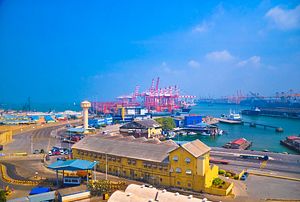Xi Jinping is three countries into his four country tour of Central and South Asia. After a stop in Tajikistan for the Shanghai Cooperation Organization (SCO) summit, Xi visited the Maldives and Sri Lanka. As Ankit pointed out yesterday, cooperation on the Maritime Silk Road (MSR) was a centerpiece of Xi’s visits to the latter two countries. As island nations in the Indian Ocean, the Maldives and Sri Lanka are both crucial to the initiative and also stand to reap benefits from being situated as stops on a larger maritime trade route.
Accordingly, leaders from both countries were enthusiastic about joining the project. In an interview with Xinhua, Sri Lankan President Mahinda Rajapaksa expressed his country’s eagerness to join in the process of building the MSR. Actually, Sri Lanka is already part of the initiative. The island received $1.4 billion from China to build the “Colombo Port City,” part of a bid to mold the island country into a rival to thriving ports in Singapore and Dubai. Xi is expected to attend an inauguration ceremony at Port City during his brief stay in Sri Lanka.
Maldivian President Abdulla Yameen was similarly supportive of the MSR project, telling Xi and reporters that “the Maldives is honored to now feature among China’s partners in building the 21st Century Maritime Silk Road.” The Maldives has not enjoyed Chinese investment on the same level as Sri Lanka has, but that is beginning to change. During Xi’s visit, China and the Maldives signed agreements for China to upgrade the Maldives’ airport and to build a bridge from Male, the capital, to the island hosting the Maldives’ international airport. President Yameen suggested that the new bridge could be called “the ‘China Bridge’ to symbolize the friendly ties between the two countries.”
The Indian Ocean states are interested in the project — even India has expressed interest in joining, although there are few specifics at the point (something likely to be on the agenda for Xi’s visit this week). Ironically, the MSR may prove to be a tougher sell closer to home.
The concept of the Maritime Silk Road first emerged in the context of Southeast Asia. Xi Jinping presented the idea in a speech to Indonesia’s parliament in October 2013. Southeast Asia will be in effect the first stop on the MSR outside of China itself and thus is crucial to the success of the project. But increased tensions in the South China Sea have made the idea of maritime cooperation between China and Southeast Asia a hard sell for Beijing.
Even as Xi toured South Asia, the MSR was on display this week at the China-ASEAN Expo, held in the Chinese city of Nanning. In fact, the theme of this year’s event was “jointly building the 21st Century Maritime Silk Road.” At the expo, Vice Premier Zhang Gaoli noted in a speech that ASEAN is a key part of the Maritime Silk Road. Zhang said that China and ASEAN are considering making 2015 “the Year of China-ASEAN Maritime Cooperation,” which would give China the chance to spend next year rolling out high-profile diplomatic efforts on the MSR.
Interestingly, though, Zhang mentioned increased maritime cooperation in the security realm, not just in trade. According to Xinhua, Zhang “expressed hope in exploring the possibility of exchange and cooperation between maritime law enforcement agencies.” Given that many regional counties use their coast guards and other para-military agencies to enforce their claims in the South China Sea, interaction and cooperation between these law enforcement agencies could be a major step forward in reducing maritime tensions.
While increased maritime cooperation with China may not look appealing to countries like Vietnam and the Philippines, other members of ASEAN are already on board. Cambodian minister Kao Kim Hourn praised the Maritime Silk Road plan as a boon for the entire region. “China and the Association of Southeast Asian Nations (ASEAN) see economic cooperation as a top priority, so it is necessary to build a maritime silk road in order to bolster economic cooperation, particularly in the fields of trade, investment and tourism,” he told reporters in Phnom Penh after attending the China-ASEAN Expo.

































